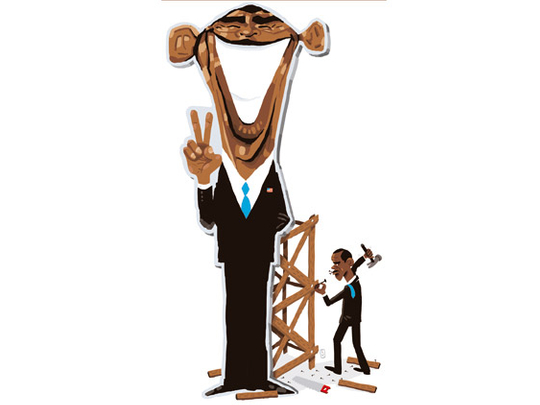
Having spent the last few days in Washington I can report that among Middle East types in the American capital, one question has dominated the last week: why did he do it?
Why did President Barack Obama invest his prestige in a Middle East peace summit? What purpose was served by starting yet another peace process? Especially one that almost everyone in Washington who keeps track of such things believes is doomed to fail?
There are several possible answers to this question, none of them especially edifying.
Perhaps the most cynical explanation is misdirection — the idea that Obama's main purpose was to take voters' minds off of Iraq. Certainly the timing of last week's summit was a bit odd, coming a day after the president's nationally televised address announcing the supposed end of America's combat mission in Iraq.
Rebranding exercise
If misdirection was the goal, however, it did not work. Obama's Iraq speech received far more media coverage than the following day's Middle East photo-op. Much of that media coverage noted that with 50,000 troops remaining in Iraq it stretches credulity to say combat has ended. The bitterest comments have come from the political left — normally Obama's base — who have dismissed the speech as little more than an exercise in rebranding, and not a particularly successful one at that.
This brings us to theory number two: the revived peace process is a tactic born of domestic politics. According to this scenario, a highly visible push for Middle East peace will help mobilise Jewish voters in November — especially the sort of moderate American Jews who have long been frustrated with the hard-line lobbying of AIPAC.
For voters such as these the fact that Obama is trying to break the Middle Eastern impasse counts for almost as much as would succeeding.
Still, it was odd to watch Obama devote the better part of a week to foreign policy only nine weeks before the midterm elections.
This leads, in turn to theory number three: desperation.
Conventional wisdom holds that November's elections represent a looming disaster for Obama and the Democrats. True, many argue that any moment the president does not spend talking about jobs and the economy is a moment wasted, but it is also true that talking up the economy has not proven to be an especially effective strategy. The administration's attempt to rename the last few months ‘recovery summer' has been met with almost universal derision, so why not turn to foreign policy, an area that offers any president the opportunity to project statesman-like gravitas?
Then there is theory number four: wishful thinking. Much of the pre-summit analysis harped on comparisons of Israeli Prime Minister Benjamin Netanyahu to Richard Nixon. In Cold War America, readers and viewers were constantly reminded, only Richard Nixon, the cold warrior par excellence, could reach out to Communist China without fear of being called soft or a traitor by the right — after all, he had been the hard-line right's leader for decades.
Like many historical analogies this one has a marvellous, superficial appeal to it. It ignores the real question. This question is not: ‘Is Bibi in the right political spot to become Israel's Nixon?' but rather ‘Does he have any actual interest in doing so?' So far the evidence that he does is, to put it charitably, thin.
What is left? Theory number five, perhaps the most optimistic of all, holds that Obama simply believes the moment, while far from ‘right', is not likely to get better anytime soon.
Delay on the ground merely emboldens extremists on all sides. If the Democrats do get clobbered in November Obama will have even fewer cards to play than he does today. Yet if he manages to get a negotiating process moving forward, however delicately, there is at least a chance that it will become self-sustaining.
The sad fact it that theory number five, while thin at best, stands the best chance of actually working (assuming, for the sake of argument that it is true to begin with).
A major debate in Washington's Middle East circles over the last few years has concerned the idea of talks. It was once received wisdom that talks, in and of themselves, are a good thing — better, at least, than the alternative.
Over the last decade this belief has repeatedly been called into question. So the simplest explanation may be that Obama is moving forward on the Israeli-Palestinian front because he still believes in talking for talking's sake.
That is not much to build a policy on. But, for now, it might have to do.
Gordon Robison is a writer and commentator who has covered the Middle East for ABC News, CNN and Fox since the 1980s. He has also taught Middle East Studies and Islamic History at Emerson College and the University of Vermont.









